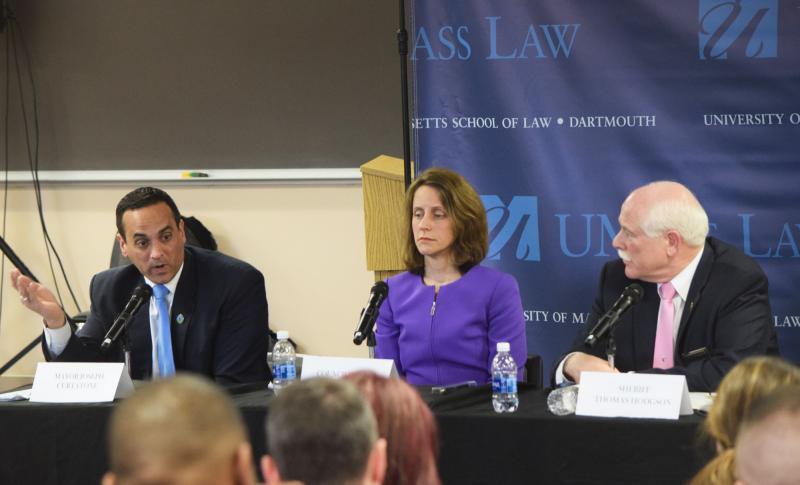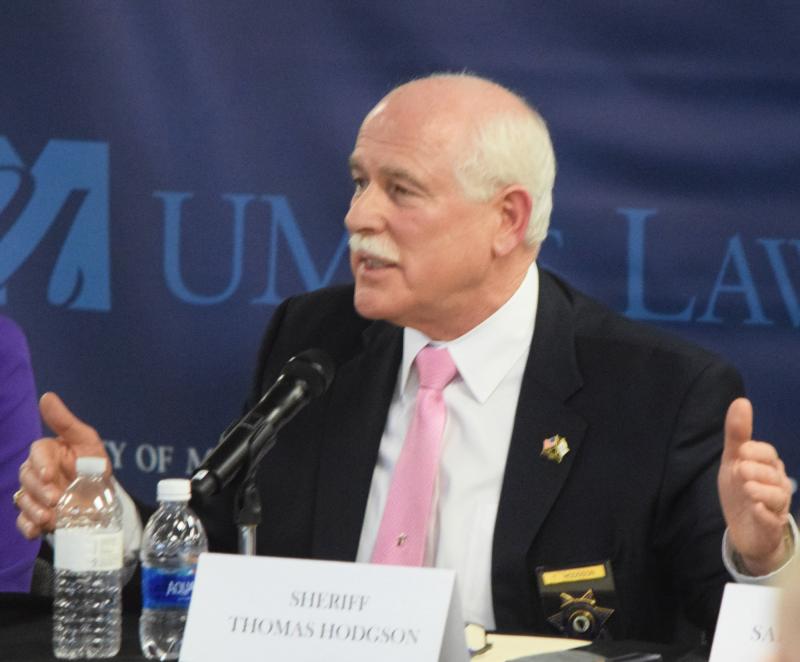Sheriff, Somerville mayor clash over sanctuary cities
Bristol County Sheriff Thomas Hodgson did not bring handcuffs to a symposium on sanctuary cities, but stuck to his belief that public officials who implement the policy are breaking the law.
Hodgson joined public officials from two cities that protect its undocumented residents, Somerville Mayor Joseph Curtatone – who challenged Hodgson to “come and get me” last week – and Newton councilwoman Emily Norton at the University of Massachusetts Law Immigration Symposium on April 6.
Hodgson recited a federal law which makes it a felony to harbor or attempt to harbor or conceal those in the country illegally, and contended sanctuary cities endanger public safety.
“If I was Mohamed Atta or the Tsarnaev brothers, I’d be seeking out sanctuary cities. I wouldn’t be targeted there,” Hodgson said.
Norton disputed that idea, touting Newton as one of the safest cities in America, and questioned the relevance of 9/11 and the Boston Marathon bombing.
“The sheriff offers a lot of anecdotes, but how many people saw US News and World Report’s ranking of the number one state in the country,” Norton asked. “It’s Massachusetts. I think we’re doing very well. In terms of data, what’s more of a risk to Americans? Falling in the bathtub, or a terrorist attack?”
During a heated exchange, Curtatone attacked Hodgson’s suggestion that sanctuary cities conflict with his oath to uphold the law.
“Guess what, you and I took the same oath to protect undocumented immigrants as well,” Curtatone said. “The Constitution applies to them as well. If you can’t see that you need to check yourself in here and maybe take a class in constitutional law right here at UMass Law because that is fact.”
Curatone noted removing undocumented immigrants from the country could cost the economy $5 trillion over 10 years and cause difficulty filling jobs. But Hodgson has a solution.
“There’s an idea that we can’t find people to do the picking of the crops. We can,” Hodgson said. “Do you know how many prisoners we have who would love to get out every day to pick crops and do whatever work they can to earn a small amount of money?”
Amid a cry of “slave labor” from the audience, panelist Sarand Sekhavat from the Massachusetts Immigrant and Refugee Advocacy Coalition said it had been tried before.
“United Farm Workers had a campaign called ‘Take Our Jobs,’” Sekhavat said. “No one took them up on it. A Georgia law drove out farm workers, so they tried bringing in prisoners. They couldn’t cut it. They couldn’t last a day in those fields.”
Panelists did agree on the need for immigration reform.
“If Congress wants to sit down and do what they should do, which is drill down and really deal with these issues instead of just using it as political football,” Hodgson said.
Curtatone said he felt frustrated with Congress’s inability to come up with a plan for immigration reform.
After the panel, former congressman Barney Frank gave his own solution to the immigration problem during his keynote speech. Instead of physical efforts, like building a wall or stepping up immigration enforcement, Frank proposed tackling a driver of illegal immigration: jobs.
“If you really want to shut down illegal immigration, the only thing that will work is establishing a national registry of people with the legal right to work in this country,” Frank explained. “Physically trying to keep people out of a free society is very hard to do.”
Frank’s idea includes requiring employers to check each employee against the database to ensure only those legally in the country are able to get jobs.


















